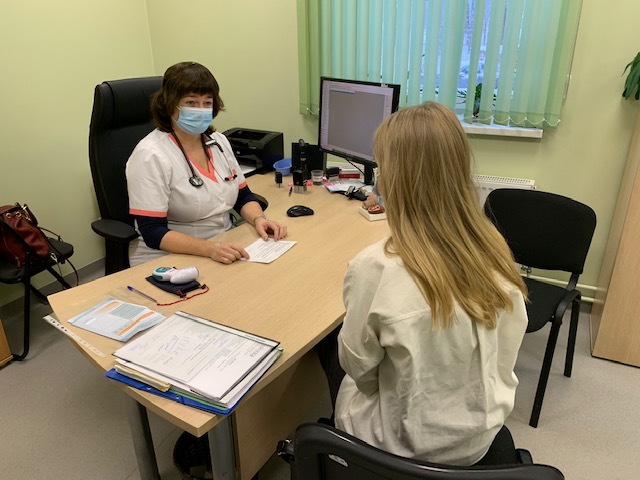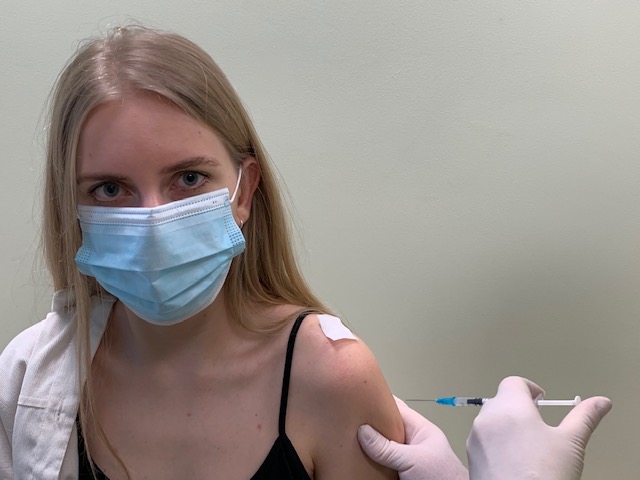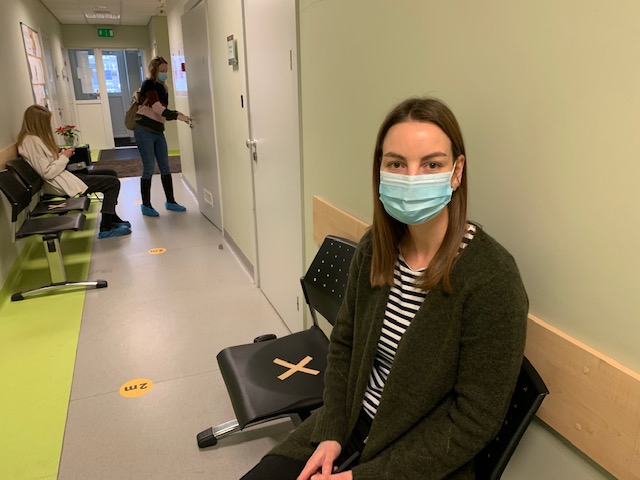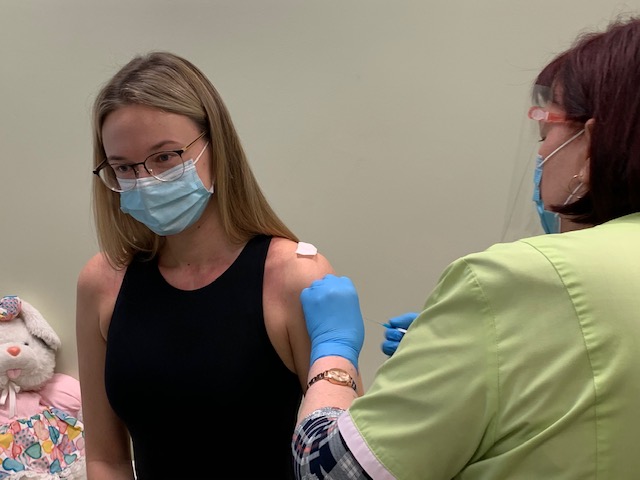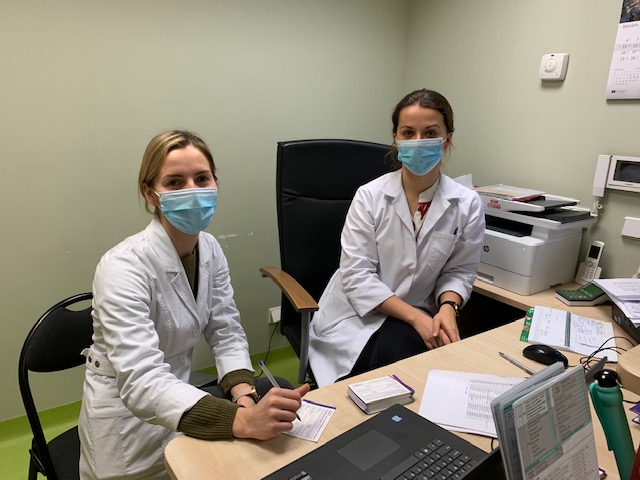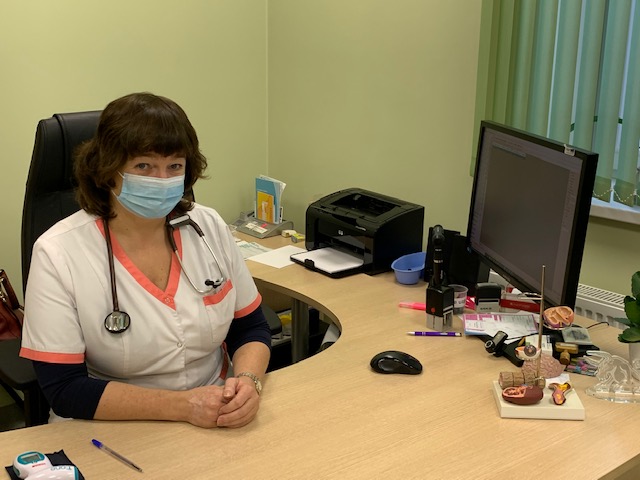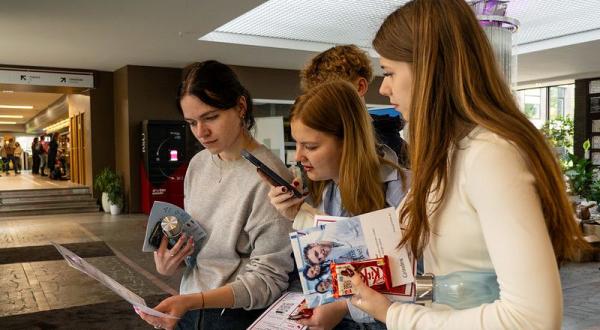Hectic Conditions at the RSU Health Centre as Students and Residents get First Vaccines
Every day this week, the staff of the Rīga Stradiņš University (RSU) Health Centre have had their hands full with students or residents arriving every 15 minutes to get their vaccine against COVID-19. The pace is like on a battlefield: residents work in the reception, nurses administer vaccines, and Doctor Sandra Gintere, lecturer, general practitioner (GP) and Head of the RSU Health Centre, interviews each patient before their vaccination.
Anna Pentjukova, a 6th-year student at the Faculty of Medicine, has arrived on time to receive her vaccine. Her visit starts with an interview by Dr. Gintere who enquires into the student’s health and makes sure that the vaccine won't have an adverse effect. This is followed by a visit to the vaccination office, and very soon she has already received the important vaccine.
Anna Penkjukova, a 6th-year student at the Faculty of Medicine has come to the RSU Health Centre to get vaccinated against COVID-19
After receiving the vaccine, patients have to stay for an additional 20 minutes so that medical professionals can monitor their condition. There is now a window to ask Penkjukova how she feels about the vaccine. The student believes that there is currently an abundance of different information about the vaccine, and warns people not to believe everything they read, but to check the source.
The student herself has read up on many different sources and is therefore able to tell her friends and relatives about how the vaccine works and assert them that vaccination is the only way for society to return to normal.
Tija Ausmane, a 6th-year student at the Faculty of Medicine (pictured above) has already received her vaccine and is waiting for the 20 minutes to pass. The student says that the process is very well-organised and that everything has gone smoothly. If she were afraid of getting vaccinated, she might have hesitated to come, but she isn’t. Ausmane has also read up on information about the vaccines and trusts what she reads.
Her clinical placement will start very soon, in February, which is why getting vaccinated is particularly important.
The doorbell rings at the RSU Health Centre, and the next student comes in. It is Marija Pērkone (pictured above), who will also soon begin her clinical placement. She will be working at the health centre Elite for four weeks and at the Riga Psychiatric Hospital for two. After the injection, Pērkone says she could hardly feel the jab. The student admits that it is only human to have doubts, including about the vaccine, but what she has learned at the University is enough for her to overcome any fears and to understand that, rationally, there is no basis for doubt.
Medical residents have come to help so that the daily work of the RSU Health Centre is not interrupted and that regular patients can receive the help they need. Today it is residents Aiga Āboliņa and Alise Ralle (pictured above) who are working in the reception. They regulate the flow of patients, write medical record forms for those who have come to be vaccinated, prescribe medication, make appointments and provide phone consultations. As the centre’s nurses are busy vaccinating, the students do everything the nurses would usually do. While we are talking, a patient comes in to get a referral to see a urologist.
Ralle believes that right now, not even infectious disease specialists would be able to answer the question of whether the vaccine will stop the pandemic. It will be important to see to what extent transmission rates will be reduced, but regardless, the strain on hospitals will definitely lessen. Both residents says that what they learned from RSU Professor Dace Zavadska has been very helpful. Rumours and uncertainty are dangerous, such as wondering what possible reactions there might be after the injection. Both residents received their vaccines a few days prior and say that the only reaction has been mild and temporary pain at the site of the jab.
The vaccination process at RSU is managed Dr. Gintere, the Chairperson of the Board of RSU Health Centre (pictured above). She listens to and interviews each student who comes to be vaccinated. The Head of the Health Centre says that the vaccination process began two weeks ago when faculties drew up lists of applicants which then had to be meticulously scheduled. The Health Centre ordered the required number of vaccines accordingly. They are delivered unfrozen and must be used within five days.
At present, it is those 6th-year students who plan to undergo placements who are being vaccinated. Students who already work at clinics have been vaccinated where they work. This has made it possible to not only vaccinate students from the Faculty of Medicine, but also those from the Faculty of Public Health and Social Welfare and the Faculty of Dentistry.
Dr. Gintere wants to extend her gratitude to the medical residents in family medicine who work from 8:00 until 19:00, and even a little more, to cover the regular duties of the clinic, as the rest of the staff are busy with vaccinating. As an example of how uninterrupted the clinic’s regular care is, Dr. Gintere tells us about a case where a patient with a heart condition was taken to hospital with an ambulance following their examination.
The door of the clinic rings again, announcing that the next student has arrived for their vaccine.
